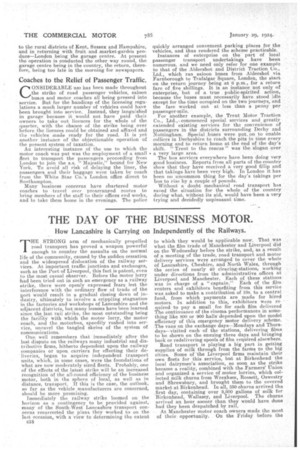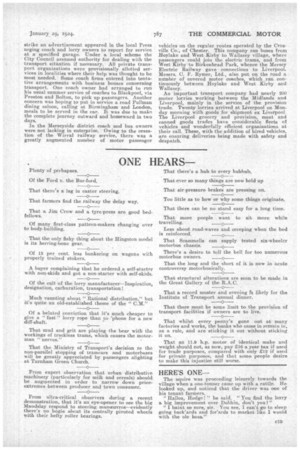THE DAY OF THE BUSINESS MOTOR.
Page 2

Page 3

If you've noticed an error in this article please click here to report it so we can fix it.
How Lancashire is Carrying on Independently of the Railways.
THE STRONG arm of mechanically propelled road transport has proved a weapon powerful enough to counter the assaults on the normal life of the community, caused by the sudden cessation and the widespread dislocation of the railway services. At important traffic junctions and exchanges, such as the Port of Liverpool, this fact is patent, even to the most casual observer. Before the motor lorry had been tried out in such an emergency as a railway strike, there were openly expressed fearw lest the interference with the ordinary flow of trade of the port would result in a gradual closing down of industry, ultimately to involve a crippling stagnation in the factories and workshops of Lancashire and the adjacent districts, hut many lessons have been learned since the last rail strike, the mo-st outstanding being the facility with which the motor lorry, the motor coach, and the motorbus, speedily rushed into service, unravel the tangled skeins of the system of communications.
One well remembers that immediately after the last dispute on the railways many industrial and distributive firms, hitherto dependent upon the railway companies or upon, carriers for effecting their deliveries, began to acquire independent transport units, which, in some cases, were the foundations of what are now moderately sized fleets. Probably, one of the effects of the latest strike will be an increased recognition of the all-round efficiency of the business motor, both in the sphere of local, as well as in distance, transport. If this is the case, the outlook, so far as the vehicle manufacturers are concerned, should be more promising. Immediately the railway strike loomed on the horizon as a contingency to be provided against, many of the South-West Lancashire transport concerns resurrected the plans they worked to on the lastoccasion, with a view to determining the extent cis
to which they would be applicable now. That was what the film trade of Manchester and Liverpool did on the Wednesday before the strike, and, as a result of a meeting of the trade, road transport and motor delivery services were arranged to cover the whole of Lancashire, Cheshire, and North Wales, through the series of nearly 40 clearing-stations, working under directions from the administrative offices at Liverpool and Manchester. Each of these stations was in charge of a "captain." Each of the film renters and exhibitors benefiting from this service was asked to make a contribution of 1.0s. to a central fund, from which payments are made for hired motors. In addition to this, exhibitors were required to pay a small fee for each film delivered The continuance of the cinema performances in something like 800 or 900 hallsdepended upon the model efficiency of this emergency motor delivery scheme. The vans on the exchange days—Mondays and Thursdays—visited each of the stations, delivering films to be shown on the ensuing three days and bringing back or redelivering spools of film required elsewhere.
i Road transport s playing a big part in getting supplies of milk through from the farms to the big cities. Some of the Liverpool firms maintain their own fleets for this service, but at Birkenhead the local dairymen's association, so soon as the strike became a reality, combined with the Farmers' Union and organized a service of motor lorries, which collected milk churns from Wrexham, Rossett, Oswestry and Shrewsbury, and brought them to the covered market at Birkenhead. In all, 350 churns arrived the first day, containing over 3,000 gallons of milk for Birkenhead, Wallasey, and Liverpool. The churns arrived an hour sooner than they wOuld have done had they been despatched by rail.
• At Manchester motor coach owners made the most of their opportunity. On the Friday before the strike an advertisement appeared in the local Press urging coach and lorry owners to report for service at a specified garage. Under a local scheme the City Council assumed authority for dealing with the transport situation if 'necessary. All private transport organizations were provisionally allotted services in localities where their help was thought to be most needed. Some coach firms entered into tentative arrangements with business houses concerning transport. One coach owner had arranged to run his usual summer service of coaches to Blackpool, via Preston and Bolton, to pick up passengers. Another concern was hoping to put in service a road Pullman dining saloon, calling at Birmingham and London, meals to be served in the car. It was due to make the complete journey outward and homeward in two days.
In the Merseyside district coach and bus owners were not lacking in enterprise. Owing to the cessation of the Wirral railway service, there was a greatly augmented number of motor passenger vehicles on the regular routes operated by the Crosville Co., of Chester. This company ran buses from Hoylake and West Kirby to Wallasey village, where passengers could join the electric trams, and from West Kirby to Birkenhead Park, whence the Mersey Electric Railway gave connections to Liverpool. Messrs. C. F. Rymer, Ltd., also put on the road a number of covered motor coaches, which ran continuously between Hoylake and West Kirby and Wallasey. An important transport company had nearly 200 motor lorries working between the Midlands and Liverpool, mainly in the service of the provision trade. Twenty lorries arrived at Liverpool on Monday morning with goods for shipment ex Liverpool. The Liverpool grocery and provision, meat and canned goods trades have considerable fleets of vehicles and wonderfully efficient organizations at their call. These, with the addition of hired vehicles, are ensuring deliveries being made with safety and despatch.


































